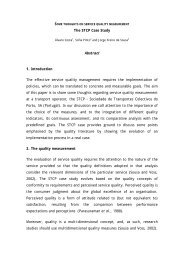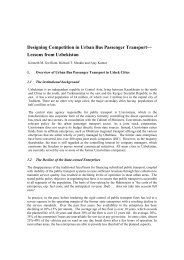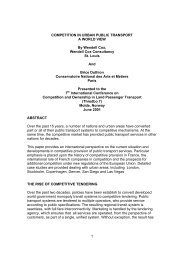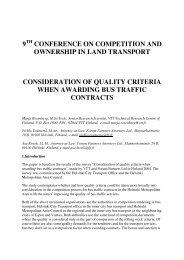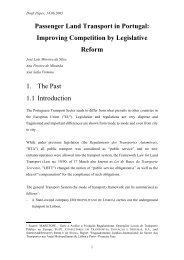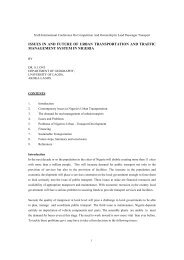the need for regulatory and ownership change in the road ...
the need for regulatory and ownership change in the road ...
the need for regulatory and ownership change in the road ...
You also want an ePaper? Increase the reach of your titles
YUMPU automatically turns print PDFs into web optimized ePapers that Google loves.
companies were not allowed to <strong>in</strong>crease fares, <strong>the</strong>y were not permitted to discharge<br />
any employees <strong>and</strong> <strong>the</strong>y were required to operate bus services that were not thought to<br />
be of <strong>in</strong>terest to <strong>the</strong> private sector.<br />
The peopleised companies lasted five years, dur<strong>in</strong>g which time <strong>the</strong>y susta<strong>in</strong>ed huge<br />
losses. Although <strong>the</strong>y were supposed to have been arms length companies, <strong>the</strong>y were<br />
<strong>in</strong>solvent throughout <strong>the</strong>ir existence <strong>and</strong> were kept <strong>in</strong> bus<strong>in</strong>ess by state fund<strong>in</strong>g.<br />
Throughout <strong>the</strong>se five years, <strong>the</strong> private sector consolidated. Their m<strong>in</strong>ibuses were<br />
gradually replaced by st<strong>and</strong>ard Indian-built s<strong>in</strong>gle-decker buses. The consolidation<br />
was on <strong>the</strong> better routes, leav<strong>in</strong>g <strong>the</strong> peopleised companies with <strong>the</strong> less lucrative<br />
routes.<br />
Fur<strong>the</strong>r legislation <strong>in</strong> 1984 took <strong>the</strong> 93 peopleised companies <strong>and</strong> <strong>for</strong>med <strong>the</strong>m <strong>in</strong>to 11<br />
new companies known as Cluster Bus Companies. Shares <strong>in</strong> <strong>the</strong> old companies were<br />
taken away from employees without compensation. In <strong>the</strong> new Cluster Bus<br />
Companies, employees were allocated just 10% of <strong>the</strong> shares with <strong>the</strong> state-owned <strong>the</strong><br />
o<strong>the</strong>r 90%. Little else <strong>change</strong>d. The private sector companies cont<strong>in</strong>ued to operate<br />
commercially <strong>and</strong> <strong>the</strong> state-owned sector cont<strong>in</strong>ued to operate <strong>in</strong>efficiently <strong>and</strong><br />
cont<strong>in</strong>ued to decl<strong>in</strong>e.<br />
In 2002, a decision was made to <strong>in</strong>troduce private capital <strong>in</strong>to state own<strong>in</strong>g<br />
companies. This was largely part of <strong>the</strong> process of <strong>the</strong> country emerg<strong>in</strong>g from <strong>the</strong><br />
civil war <strong>and</strong> its <strong>need</strong> to secure <strong>the</strong> assistance of agencies such as <strong>the</strong> Asian<br />
Development Bank <strong>and</strong> <strong>the</strong> World Bank, both of which organisations purport to <strong>in</strong>sist<br />
upon privatisation as a condition of <strong>the</strong>ir fund<strong>in</strong>g. As a result, it was decided that<br />
organisations, companies or consortia would be <strong>in</strong>vited to enter <strong>in</strong>to Public Private<br />
Partnerships (PPPs) <strong>and</strong> to acquire 39% of <strong>the</strong> shares <strong>in</strong> one or more of <strong>the</strong> Cluster<br />
Bus Companies. There was only one bidder – a consortium of British <strong>and</strong> Sri Lankan<br />
companies, <strong>and</strong> that consortium was awarded five of <strong>the</strong> eleven companies, <strong>the</strong><br />
government not be<strong>in</strong>g prepared to give all eleven to one bidder. These five<br />
companies brought with <strong>the</strong>m 49 bus depots, 2500 buses <strong>and</strong> 23,500 employees. The<br />
PPP policy was very unpopular with <strong>the</strong> government’s political opponents, who took<br />
<strong>the</strong> view that it was <strong>in</strong>tr<strong>in</strong>sically wrong to sell state assets to <strong>for</strong>eign <strong>in</strong>vestors.<br />
Despite low fare levels, control of fares was reta<strong>in</strong>ed by <strong>the</strong> government. Fares<br />
<strong>in</strong>creases were politically sensitive <strong>and</strong> were to be avoided.<br />
In early 2003, this paper’s co-author was appo<strong>in</strong>ted Group Chief Executive to manage<br />
<strong>the</strong> five companies secured by <strong>the</strong> consortium. As mentioned later, <strong>the</strong> tenure was<br />
short lived as an election <strong>in</strong> early 2004 brought <strong>the</strong> opposition <strong>in</strong>to power <strong>and</strong> <strong>the</strong><br />
cancellation of <strong>the</strong> agreement with <strong>the</strong> consortium.<br />
(An exam<strong>in</strong>ation of <strong>the</strong> <strong>regulatory</strong> <strong>change</strong> <strong>in</strong> <strong>the</strong> Sri Lankan bus market is provided by<br />
Gwilliam (2003), although this paper was compiled be<strong>for</strong>e <strong>the</strong> governmental <strong>change</strong>s<br />
referred to here had made <strong>the</strong>ir impact.)<br />
4.3 Observations<br />
The follow<strong>in</strong>g po<strong>in</strong>ts were apparent with<strong>in</strong> <strong>the</strong> first two months of <strong>the</strong> consortium<br />
assum<strong>in</strong>g control.



